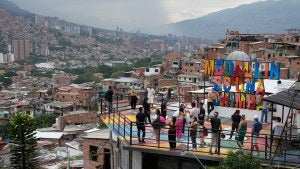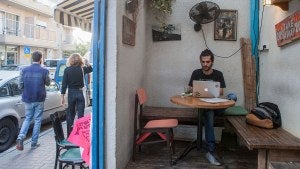When digital nomads come to (Chi)town

From Medellín to Chicago, digital nomads are on the rise, contributing significantly to the global economy. But locals worry these visitors are pricing them out.
Spurred by the pandemic, digital nomads, or those traveling freely while working remotely, are on the rise. They contribute billions to the global economy each year, account for more than 35 million employees worldwide — 17 million of them from the U.S. — and can be found in just about any city with good Wi-Fi, including Chicago.
As more companies allow remote work, more places are embracing the digital nomad lifestyle for its economic benefits. More than 50 countries now offer a digital nomad visa — Japan just announced its own last month — but the U.S. doesn't. Nomads wishing to temporarily live and work in the States must obtain a B-1 visa, which can make it difficult for some to visit.
“The influx of foreign money ultimately benefits everyone,” said Claudia Heredia, who heads the Medellín Convention and Visitors Bureau in Medellín, Colombia, in an interview with Rest of World. Pleasantly warm and affordable, Medellín is one of the most popular destinations in South America for digital nomads — its two-year digital nomad visa being a major draw.
What makes certain cities appealing?
Though each nomad has their own needs and preferences, there are a few things that make some cities more conducive to the lifestyle: accessible Wi-Fi, affordability, public transportation, and a convenient time zone for working and meeting deadlines.
Local culture, a comfortable climate, and a sense of community are also important.

Tourists in the Comuna 13 neighborhood of Medellin, Colombia.
“The greatest thing about being a digital nomad is really feeling like you live there, feeling like you’re a part of it,” said Brianna Hurley, a 35-year-old publicity director from Canada working in Dar es Salaam, Tanzania, in an interview with ChicagoGlobal. “You get a sense of the people and the community ... the city and where things are to a much different degree than you would if you’re just visiting.”
Safety, a digital nomad-friendly visa program, and coworking culture also rank high.
Does Chicago make the cut?
Though the most popular and fastest growing cities for digital nomads are outside of the U.S., Chicago ranks sixth best in the country, according to Zumper, a rental marketplace website. The Windy City gets an “A” for its Wi-Fi, public transportation, restaurant, and entertainment options; a “C” for airport accessibility; and a “D” for air quality, median nightly cost of short-term rentals ($197), and cost of living (about 20% above the national average).
"Chicago is well-positioned for nomads as we have the very elements they seek, i.e., all the natural advantages of a rapidly growing tech and startup ecosystem, from high quality of life to annual flagship events,” said Abin Kuriakose, Chief Innovation Officer at World Business Chicago, in an email to ChicagoGlobal. “We also have numerous coworking spaces and venues that actively engage with digital nomads and professional visitors in very creative and meaningful ways. Here, like-minded digital nomads can easily connect, network, and convene."
Though the Canadian dollar doesn’t stretch as far, Hurley says a benefit of nomading in a U.S. city like Chicago is not having to juggle the “foreign” aspects of travel — SIM cards, unreliable internet, daily power outages, where to find drinking water, etc. “A load is lifted when you’re not worried about those things." She added that if you have a busier month or two, Chicago might be a great stop-over to focus on your work.
When Gert Ebner, a Chilean community experience manager at Remote Year, was asked to facilitate a month-long digital nomad program in Chicago in the summer of 2022, he jumped at the opportunity. “For me, it was exciting to see a major city in the States. From a work perspective, I got to build up our platform and run our product there,” he told ChicagoGlobal.
His first week in Chicago was unnerving due to the Highland Park Independence Day parade mass shooting just days before. “But then the magic of Chicago happened. I got the opportunity to meet some local people — their energy and willingness to have fun and explore ... if you ask me today, I’d go back.”

Gert Ebner on a boat in Lake Michigan (left) and at a Cubs game (right) during his time in Chicago for Remote Year.
Impacts of digital nomads on local economies
Not every destination benefits the same way from the presence of digital nomads. The influx of visitors in certain cities and neighborhoods can distort the local economy, contributing to gentrification and skewing the cost of living for residents.
In Mexico City, locals often complain about the high cost of rent and displacement.
“There’s foreigners everywhere. I don’t see it as a bad thing – I'm glad these people chose to come here,” said Gonzalo Vazquez de Icaza, a lawyer and content creator from Mexico, in an interview with Vice. “But I’m very aware of the problems that it brings, in terms of gentrification and the people that are being displaced by it.”
In European cities like Lisbon, Paris, and Vienna, officials have tightened restrictions on Airbnbs in an effort to make housing more affordable for locals and to combat an overabundance of short-term rental stock. In the popular neighborhood of Santa Maria Maior in Lisbon, for example, short-term rentals make up more than 60% of housing in the area.
“We as digital nomads do bring up costs,” said Jeff Kloythanomsup, a 35-year-old cloud engineer from Los Angeles, who has been a digital nomad for more than a decade and visited 43 countries, in an interview with ChicagoGlobal. “Personally, I try to stay in hostels and eat at regular restaurants. I wouldn’t go to a city that’s still developing and stay in the best places or eat at the best restaurants, because that’s not really experiencing that culture.”
However, supporting the digital nomad lifestyle can also have positive impacts on local economies. Nomads invest their time and money in the community, without taking local jobs. They help foster entrepreneurship, creating technology clusters around the globe. And they connect and exchange ideas with local workers, acting as “catalysts for knowledge and resource flows between regions, benefitting themselves, their organizations, and their host countries.”

A man works from a cafe in the Florentin neighborhood of Tel Aviv, Israel.
The future, globally and locally
Wherever nomads go, they leave their footprint in established — and often historical — communities, injecting money into local businesses and contributing to an ongoing shift in local culture and demographics.
“I think it will be important to have some balance,” said Alejandro Echeverri, an urban planning professor in Colombia who helped lead an effort to transform Medellín’s image, in an interview with The World. “There are two different groups, one that is taking advantage of the new situation and one that is suffering. So, how you balance that is the question.”
As for Chicago, Kuriakose says the city "boasts significant economic advantages that deserve broader recognition" and that it’s imperative we proactively showcase them "to ensure our story stands out amidst the array of options that nomads consider when choosing their next destination."
This story first appeared in the ChicagoGlobal newsletter, a joint project of Crain's Chicago Business and the Chicago Council on Global Affairs.

